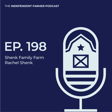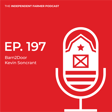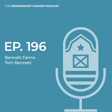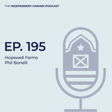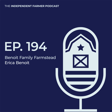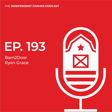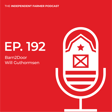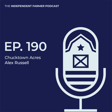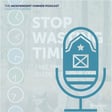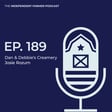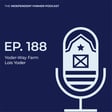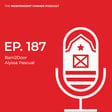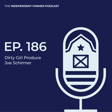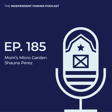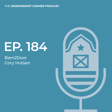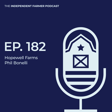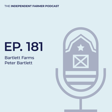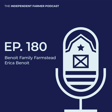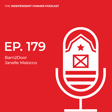Become a Creator today!Start creating today - Share your story with the world!
Start for free
00:00:00
00:00:01

Establishing a Wholesale Customer List for your Farm
In this week’s episode, Joe of Dirty Girl Produce (CA) shares his experience in building a base of Wholesale Buyers in his community. Learn best practices for attracting and retaining Wholesale Buyers, and picking which customers are right for your Farm.
For more Farm resources, visit: Barn2Door.com/Resources
Transcript
Introduction to the Independent Farmer Podcast
00:00:10
Speaker
Hello and welcome to the Independent Farmer podcast, the go-to podcast for do-it-yourself farmers who are taking control of their own business, skipping the middleman, and selling direct to local consumer and wholesale buyers.
00:00:20
Speaker
This podcast is hosted by Barn to Door, the number one business tool for independent farmers to manage their business, promote their brand, and sell online and in person. Let's dive in to today's Independent Farmer podcast.
00:00:42
Speaker
Welcome to the Independent Farmer Podcast. I'm James, the Chief Operating Officer of Barnador and your host for today's episode. As many of our listeners may be aware, Barnador offers an all-in-one business solution for independent farmers who are cutting out the middleman, taking control of their business, and selling under their own brand online and in person.
00:01:01
Speaker
In today's conversation, we're going to get into creating an ideal customer profile for wholesale buyers and how to identify and target those customers.
Joe's Background and Dirty Girl Produce Origins
00:01:09
Speaker
Today, I'm happy to welcome back Joe of Dirt or Go Produce in California.
00:01:14
Speaker
Joe is a part of our Farm Advisor Network and has worked with us for five years. Since becoming an advisor, Joe has shared many tactics for serving wholesale and retail buyers alike, selling at local farmers markets and scaling his produce operation.
00:01:28
Speaker
I'm excited to talk with Joe today about identifying wholesale buyers, how to target these customers, and how they're different than serving retail buyers. Welcome back, Joe. It's great to see you. Good to see you. Thanks for having me.
00:01:41
Speaker
Well, you're looking good. A little older than we last talked last time, but great to see that you're healthy and hope you and your family are well. Before we get started and dive in to talking more about your business, can you share up with our listeners who may not know about Dirty Goal Produce a little bit more about your origin story?
00:01:57
Speaker
How'd you guys get founded? Yeah, right. Two good friends of mine, Allie and Jane, started Dirty Girl Produce in 94. And I was an intern at a homeless garden in 93, 94 with one of them, Jane. Came really good friends with both of them.
00:02:13
Speaker
i was touring around working on farms and when I heard that they had, you know, kind of started a little garden back home. And I actually moved back to work for him. So worked for him for a couple of years and then they wanted out. So I just basically continued a dirty girl on a land they farmed, the tractor they had and the farmer's markets that they had established.
00:02:32
Speaker
2000, I had taken over the farm entirely. It's been, you know, now 25 years and it's been 30 years that Dirty Girl has been
Evolution of Farming with Technology
00:02:41
Speaker
around. So we have a lot of the same customers. I just saw customers in Berkeley that I've seen for 30 years.
00:02:46
Speaker
It's pretty crazy. Wow. Talk about a loyal customer base. That is amazing. What was it like? I mean, at that time growing the business in the early days, and I know you guys have, your growth has continued to grow and be propelled, but what was it like early days versus what it is today?
00:03:02
Speaker
Completely different. I mean, when I started, we didn't have cell phones, right? Yeah. I remember I was in ah on a farm in Santa Fe, New Mexico for the summer, and it was like off grid. I mean, 10 miles on a dirt road, you know?
00:03:14
Speaker
I bought a motorcycle just so I could get into Santa Fe. And remember driving on the way out, leaving and seeing all these billboards and the billboards. I'm like, there's another one where it said like www.whatever.
00:03:27
Speaker
There were websites. You know what i mean? So I was God, everybody's doing this website thing, you know? So it was pretty, pretty crazy back then, right? Everything analog. I mean, there was computers and stuff, but you know, you're just talking maybe like a word processor.
00:03:41
Speaker
For someone like me, we weren't really using anything. So it's crazy how technology has changed. Farmers markets have exploded. There were very few farmers markets. There were very few direct to consumer avenues that you could do. i think these are the early years when I first started.
00:03:58
Speaker
CSAs were just starting. They were just getting started and now they're all over the place. So. been crazy and we have definitely scaled up, but we've still stayed small. You know, we have 46 acres that we lease.
00:04:10
Speaker
And so when we started, we were three acres and now we're 46 and, you know, we've contracted to 25 and then back up to 40 and 50 at one point. So we I've had a lot of little leases over the time.
00:04:22
Speaker
We've mostly just grow row crops, row crop veggies, you know, organic veggies. And it's been good. What an incredible journey. Like you said, probably from any our listeners probably don't recall the era.
00:04:33
Speaker
before cell phones, let alone the internet, right? Yeah, I know that the changes have been dramatic across every industry, but I think you know farming may have been a little bit late to the game. Like you said, most farmers you know outside of word processing probably weren't using technology.
00:04:48
Speaker
When did you guys actually make the transition online? When did you guys first open up a website? I'm kind of curious about that. That's a good question. The first website, I remember it, but I'm trying to think of what year that was. It's probably been a while. It's probably been like 15 years.
00:05:03
Speaker
since we had our first website and our first website, it was so primitive and the motivation was really to try to, I wanted to put recipes online, you know, cause I basically wanted to answer the questions that people were asking me at farmer's markets. Cause that's essentially what we sold a lot. You know, we did deliveries, but that's always transactional. But when when you're at the farmer's market, people ask you so many questions, you know, how do you use this? What do
Building Trust with Wholesale Buyers
00:05:27
Speaker
you do?
00:05:27
Speaker
And so we started with this dirty girl cookbook idea and and started getting a lot of chefs, to put in recipes. So I think it's probably around 15 years ago, might have even been more, 15, 18 years.
00:05:39
Speaker
But I think that's been totally scrapped since. I think we've been on our our website like three times, four times. I don't even know how many times. And of course, getting actually using a website for e-commerce is totally different, right? It's totally different than what we used when we first got on with a website, right?
00:05:55
Speaker
Which is basically just a landing place and maybe you leave a phone number or something, you know? for someone to contact you and some info. Yeah, life's changed quite a bit since then. I'm going to probably maybe after this, go take a look at the way back time machine where I can see back, you know you know, what your website may have looked like a long time ago. It's pretty cool.
00:06:14
Speaker
Well, let's talk a little bit about wholesale buyers because you guys have done a fantastic job, you know, getting yourself into some of marquee places there in the Bay Area. Super well respected.
00:06:25
Speaker
How have you built the Dirty Girl brand to gain the trust of the wholesale buyers you serve? And maybe share with the listeners a little bit more about the types of wholesale buyers you're working with today. Yeah, well, first of all, we're positioned pretty uniquely because we're in Santa Cruz County where all our production is. And that's about 60 to 70 miles, depending on which ranch, to San Francisco.
00:06:48
Speaker
So the Bay Area, I was just telling Mamie, I think there's 8 million people in the Bay Area. it's a huge, huge food city. So we're really lucky in that way. A lot of other farmers are much more rural or further from cities that aren't as big.
00:07:02
Speaker
So we've always had sort of a presence as a small farm doing little organic veggies and having all these chefs come into our farmers markets, right?
00:07:13
Speaker
So we've always had that exposure and a lot of our PR and marketing has always come from being exposed to these chefs because restaurants, as you know, really live and die based on their reputation and what kind of review comes in the paper. And for the San Francisco Chronicle,
00:07:29
Speaker
That's a huge publication and has a really big presence. So I think a lot of it has to do with our exposure, but also since we've been doing it so long, there's nothing like time to build relationships, right? It's hard to just, if I was to just jump in and start all over, you know, without knowing anybody, without having a thousand contacts in my cell phone.
00:07:50
Speaker
it would be tricky. So over the years, a lot of customers have come and gone. I've had quite a few that have stayed with us for many, many years. And so building those relationships really take a lot of time and it takes a lot of exposure and it takes a lot of knocking on doors.
00:08:06
Speaker
And, you know, it's really interesting now that we're online, you know, we have the internet, there's different creative ways that you can reach people that back in the day you had, you know, i literally would knock on the back door of restaurants and say, hey, look what I have, you know.
00:08:22
Speaker
And that's also the idea of wholesale, that there's a lot of businesses that we put into the wholesale bucket. but We're talking and pa restaurants to corporate restaurants at big hotels to actually all the different online sort of middlemen businesses that are going on. Like around here, we have Good Eggs that does home delivery in the greater Bay area. There's a lot of different people buying and selling people that have really big distributions, there's stores, there's all kinds of stuff. So, you know, it's nice. Lots of demand and lots of possibilities.
00:08:57
Speaker
We consider restaurants to be wholesale, even though a lot of times, a lot of what some restaurants are buying, or they're buying straight retail from us, retail prices. When people see the Dirty Girl brand, right? and and And for those listeners just, you know, on a podcast right now, Joe's got a hat on right now with his Dirty Girl logo on it, which well done. That's a great thing.
00:09:17
Speaker
I love your logo. It's a very memorable and it's memorable name. What does a brand reflect? Like when people see that brand and they hear about it, I mean, what would people say if I went and talked to one of your wholesale customers? What types of things would they say about Dirty Girl Produce?
00:09:31
Speaker
Yeah, that's a good question. It's funny. I just went to the gym. i have a gym and they moved right near my house. so I walked in there and it just yesterday morning and I had not this hat, but like a nicer one. This is my work hat.
00:09:42
Speaker
And I came in and like, oh, where'd you get that hat? Did you get that from the farm? And I'm like, no, you know, i actually got this from the hat maker. He stitched it for me because this is my farm. She's like, what? Dirty old produce. Oh my God. So there's a lady behind the gym, you know, that I've never met.
00:09:56
Speaker
She knows all about Dirty girl produce. She loves it. Says their strawberries are great. She's driven by my farm before. Great. You know, i mean, it's like, it's crazy how, when I first started, I felt like everybody that knew about dirty girl produce, I knew personally, you know, like I interacted with these customers.
00:10:13
Speaker
And now because of the idea of brand awareness, I never considered my farm a brand. right? Like people are building brands, but especially when you get online and we have social media and stuff, farmers really need to start looking at themselves as a brand, especially when we're, you know, smaller, we're artisanal, we're selling something that has a value other than just the product itself. We're selling that product, which may be similar to another option they have, but it has our name on it and it has our reputation.
Role of Social Media in Farming
00:10:43
Speaker
So the only way to really gain that trust and to build that reputation is to do it over time and to constantly be putting out really good products. So we try to be the best at what we do.
00:10:53
Speaker
Not that it's like a competition, whether farmers or whatever, but I'm really critical about the quality of the produce that we grow, not just the varieties, but also the post harvest handling and the display at a farmer's market. Or when something's going out to a restaurant that's going to be delivered, I want to make sure they open that box and it's like the best romaine they've ever had.
00:11:13
Speaker
You know, the best broccoli. I mean, a lot of things we grow are very very commonplace vegetables. But when you get a regular vegetable, you get a carrot, that's really good. You're like, Oh my God, this is good. Or when you get people's strawberries, like right now it's strawberry season for us.
00:11:29
Speaker
And when you get people's strawberries and he said, that's the best strawberry I've ever had. I'm yeah, well, cause you're buying from the store and who knows how long ago those things were picked. They're grown from their shippers.
00:11:40
Speaker
You know, they're not grown to be totally red and pick the day before you eat them. you know, and that's what we do. So brand awareness is huge and it's a whole world of, you know, it's a different whole thing, especially for farmers because we're so c crusty and curmudgeon-y and we're Luddites.
00:11:55
Speaker
If I'm going to throw us all under the bus and be honest, we tend to want to retreat from the urban zones and be in our rural place where we like it. This is the life we like, but at the same time, we need to interact with our customers.
00:12:09
Speaker
And so we need to learn all these things. And that's why, you know, Coming on board with Barnador, I've spent a lot of time with a lot of people helping me how to do this kind of stuff. It's been a lot of learning. It's been really great to see how much you guys have leaned into your brand. Cause number one, like you said, you have a recognizable brand and to your point, appreciated locally by people you don't even know.
00:12:30
Speaker
Right. And the fact that you said that your brand is not just known for being a local producer, a local farm, but also for quality, right? Quality is number one, like you have to have top tier product.
00:12:42
Speaker
But to your point, you stand out big time versus other commodity products. Chef, I'm sure is going to buy from you nine times or 10 times out of 10 versus buying from Cisco or UnFi, right? They know your product is fresh. It's going to taste fantastic, right?
00:12:56
Speaker
You do a really great job on social media to featuring your products. can you share a little bit with our listeners about like how you capture those moments on the farm on social media to draw people in closer and build brand awareness?
00:13:09
Speaker
Yeah, I can still remember the first time years ago, an employee and friend Akilah was like, you should get the farm on Facebook. And I'm like, what Facebook? What what is Facebook?
00:13:21
Speaker
I was just totally not on. And I did it. And then we start seeing people interact. And oh my God, I haven't seen this person in a long time. That's just like when you know you see your family or whatever. So I remember first getting on and just being like, now what do we do? And then You start looking at it and seeing how I look at it.
00:13:39
Speaker
And then I see, okay, how's someone else going to look at it? You know, so that's always how I think about it is like, what do I want to see? And know what do i what story do I want to tell? And so one thing that I really like about social media is I always have my cell phone on me.
00:13:52
Speaker
And so when I'm doing my rounds, which a lot of what I do is really administration and management. I'm not the guy on the tractor. I'm not the guy with the knife. These are all things that happen like all day, every day. But, you know, I'm more and more like the supervisor as time goes on. And so I keep my phone on me and I take pics and videos whenever I can.
00:14:12
Speaker
And I just keep them because a lot of times too, I'll start feeling like, Oh God, we should do a social media post on Instagram or whatever, but I'm like stressing and I'm not in the mood. But if you can get that pic and get the video or even do a little selfie and say, Hey, look at this right here. These are some phylums.
00:14:29
Speaker
They're attacking the root zone, whatever. And then later on when you're in a better mood, or maybe in the morning when you drink your coffee and you have a little bit of time or you're on the couch later, you have a time to kind of fiddle around and do social media. I mean,
00:14:41
Speaker
I know some people, and a lot of businesses, they hire people out to do their social media, but I think a lot of small farms can really have the ability to be honest and genuine and do their own stuff. And I think that people really appreciate that too.
00:14:56
Speaker
Even if it's a little grainy, it's a little weird, but you know that it's coming and it's authentic. It's not too groomed, you know? So yeah, I try to do that. I try to take pics. You know, I've tried before, put on a calendar like, okay, Tuesday at noon, I'm gonna go out of the office and I'm gonna go post.
00:15:14
Speaker
And I go out and I'm just like cringing. And it's like, I don't want a camera in my face and I'm just not in the mood. You know, that happens to me all the time. And so I try to just go ahead and take the pics and take the videos.
00:15:26
Speaker
Sort it out later when I'm in the mood to deal with that kind of thing. When I'm done with my daily tasks and I have a moment or something like that. I've also incorporated a lot with my kids at different times. I'm kind of like doing less with my kids because social media and putting your kids on there can be weird.
00:15:44
Speaker
Also having them on the backend kind of fiddling around because it's kind of a cool thing to share. and to see people's reactions and stuff. So I try to keep it playful. I try to not be too robotic with it, right? You know, I'm not trying to game the algorithm as much as you can tell a lot of people are, which is probably a good thing.
00:16:03
Speaker
But in that way, I think I just try to keep it authentic with social media and try to have fun with it and tell stories because I got a lot of stories and it's hard to tell people what's going on. I think this is just such great advice, regardless of the type of buyer you're trying to hit.
00:16:18
Speaker
Being authentic, playful, and consistent, telling stories, right? Like you said, it's no reason to try to be something you're not, right? Be honest about who you are, your products, et cetera.
00:16:28
Speaker
And to your point too, it's like no harm in just taking pictures throughout the week or a small video throughout the week. I know many farms will just sit down at Metasuite once a week and you can schedule your post even right so you don't have to be out on the field at 12 o'clock noon you can just schedule it as if you were right and i'll just post as if you were out there probably you know you might be off doing something else pretty cool back to the wholesale buyer side i'm kind of curious about this you know when you think about those chefs or those corporate buyers etc do you find them on social media as well are they interacting with your content i'm sure getting a lot of consumers who are probably following you as well but do you find that the wholesale buyers too are active on social media
00:17:07
Speaker
Yeah, they
Communication Strategies for Buyers
00:17:08
Speaker
all are. They pretty much all are. I mean, if you have a business, you're active. It's very rare these days that we have like a restaurant that comes on board and is buying. And then I'll look them up because with our dirty girl site, like I have a personal Instagram account and I have a dirty girl site.
00:17:24
Speaker
And whenever someone comes and buys, I look them up and follow them. And then they'll come up in my feed and then I'll look at them too and see what they're posting. And so one thing that I've really come to start doing, especially on our two biggest farmer's market days where there's a lot of restaurant pickups, that's Saturday at the Ferry Building in San Francisco.
00:17:45
Speaker
so it's a Saturday morning. That's a really big pickup. And also Tuesday afternoon in Berkeley, that's a really big restaurant pickup. Even for people in San Francisco, they come over and pick up. And so what I'll do is we always have our sheet of all our orders, right?
00:17:58
Speaker
And I'll go and I like to have a post either of just pics or best is someone walks around and introduces the stall just to say what we have. And then ah you just tag everybody that bought that day, you know, and sometimes I'll tag people that usually buy but didn't that day or whatever, you know, but I usually like to do that. A lot of why I like to do it is because there's a lot of businesses like restaurants that really have kind of what I'd call maybe an expanded PR and marketing campaign when it comes to social media, like they're really trying to make an effort because they know that people are going to find their restaurant if they can see them online or if they're, Hey, I want to eat somewhere. Great. I'm going to look it up right now.
00:18:41
Speaker
And they're going to look up the Instagram or they're going to look up Facebook or they're going look them up online, see what they can learn about them. Right. So I noticed that when I tag them on our post, they see it, you know, and they'll like it or they'll comment. And it's a whole kind of I don't know if it's a game. That's why I like to look at it, try to keep it playful, but you know, I'll tag them all. If they buy, they get tagged.
00:19:02
Speaker
I was doing our delivery route too. I tried to tag those businesses that are, did a delivery Thursday delivery on maybe like a Wednesday afternoon, you know, stroll through the tomato fields or whatever.
00:19:13
Speaker
And you'll see that come back. Right. And so, and I think it's really good. Every once while, just scroll through. Like I'm pretty much just on Instagram. We've shared to Facebook as well, but I'll go through Instagram and I'll scroll through and all of our restaurants and all of our accounts that have made posts, I'll like, or I'll even, you know, comment and just with a heart or with this and keep it playful, keep it authentic.
00:19:37
Speaker
Like I say, not robotic, but also I'll try to make an effort to acknowledge that they're doing this, right? Because a lot of times when people, for example, want my tomatoes,
00:19:49
Speaker
I think there'll be quite a few people that want our tomatoes because they taste better than everybody else's tomatoes, right? But a lot of restaurants, they want our tomatoes, not just because they taste better and they're they're going to be popping on the plate, but because on the menu, they're going to put dirty girl produce, early girl, dry farm tomatoes.
00:20:06
Speaker
And so they use our name all the time, all the time. And that's really part of the whole game when it comes to branding and really selling yourself as a small scale farmer. You know, people,
00:20:17
Speaker
want that value added, which is not just the actual produce, but the story behind it. They want to say, hey, we are supporting our local economy. We're supporting the local farmers.
00:20:28
Speaker
This is the farmer here. Oh, I've seen that. And people come up to me all the time and say, oh, I saw your name on the menu here and there and all over the place. you know So people use it. And essentially when they buy something from me, they've bought the right to use our name.
00:20:42
Speaker
And that's really important for restaurants, especially these days. you know i don't See a lot of restaurants that are really kind of trying to really do a, I wouldn't say fine dining because there's all kinds of cafes and stuff, but I'd say elevated food, you know, they tell you where the food is when they can't, you can't always do it, but, but absolutely. So.
00:21:02
Speaker
So yeah, we like to get on that and play the social media game with them as much as we can. I think that's just really great feedback. yeah To your point, it's a two-way relationship, right? Your intention is not to game the system. The reality is by tagging all those people as well, you're actually helping raise their profile and raise their visibility in other people's feeds, right?
00:21:19
Speaker
And so obviously that's also then causing them to come back and click on you, which is also then raising your visibility. So you guys are actually scratching each other's back by doing that in a good way while also building relationships, right? So that's just great, great advice. And then what about email? I'm kind of curious because I know obviously I am actually on your email newsletter list because I always just love to see what you guys put out.
00:21:40
Speaker
And, you know, I think I'm on your consumer list. I don't know. Do you have a wholesale email newsletter list as well?
Pricing and Inventory Management
00:21:46
Speaker
Yeah, we have two. We have two. Yeah. You need to use a different email. Yeah. Okay. What do do you do differently for your wholesale newsletters?
00:21:53
Speaker
So, yeah, well, what we do, we essentially have like a retail and a wholesale newsletter and the retail comes out. Saturday morning, because our biggest retail day is really Saturday at the Ferry Building, even though we have three farmers markets on Saturday morning and then two on Sunday morning.
00:22:10
Speaker
And what we do is we highlight what's in our farm box, which is basically our CSA share. Whether we have, you know, this time of the year, you can get strawberries either in half flat or full flat.
00:22:21
Speaker
We have value added stuff, basically like generic bulk bins. We don't customize our CSA at all. We have a salad box and it's essentially shows what exactly is in the box this week.
00:22:32
Speaker
And then we have an opportunity to give any kind of update that we want to do. For example, we just did a campaign this spring to get people to have subscriptions for our tomatoes.
00:22:42
Speaker
And what we allowed is people to do upfront, I forget it was six or eight week tomato subscription. And so it's all paid up front for the whole subscription. The subscription was available to buy in April, but they're not getting it until the end of July.
00:22:57
Speaker
Right. And it's basically this whole thing of, Hey, help support our farm. buy a prepay for a subscription at this price, right? And so we have, you know, those sorts of games and those sorts of information that what's going on in the farm, that's retail.
00:23:10
Speaker
On wholesale, what we always have is exactly all the items that are going to be live because the way that we sell wholesale is all of our items, everything that we have. And what's great about Barn to Door, it really allows us to put items that otherwise have a very limited inventory. It's always easy when you have an infinity, you know, like I could sell a pallet of strawberries to someone, but we might only have 24 bunches of turnips for the weekend. So I can put all 24 turnips on there. And when it sells out, it sells out.
00:23:40
Speaker
And when I want highlight, Hey, we are swimming in Romaine right now. And so we're going to put a special on, I'll lead our wholesale newsletter with Romaine sale. And with the You know, you put the picture of the romaine, the best picture you can get of romaine that looks really good.
00:23:55
Speaker
And they can just click that and go right to the store and buy it, right? So it really changes how I want to categorize what people see and what they want to know and how people are buying. I mean, a wholesale buyer buys things by the item, whatever quantities they want. And our retail buyers, we try to push subscriptions because that's always nice, but also we do single purchase. And so we want to update exactly what's going to be in this week's box, you know.
00:24:20
Speaker
And the wholesale goes out Sunday afternoon and it goes out Sunday afternoon because another item that we are able to do really because of Barnes door is we are able to sell all the produce that comes back from the farmer's market.
00:24:36
Speaker
We call it, you know, lefties, ex lefties is kind of funny little slang. And so we'll have all of our items. And then below that we'll have ex-lefty items and they're like either half price or dollar bunches.
00:24:50
Speaker
Or also when we're just swimming in an item, I'll put ex-lefties, I'll just bulk up, like put 500 pounds of romaine because we're swimming in it. And if price is an issue for someone, i don't want to stop them from buying it. So we really play a lot with the wholesale on trying to push items that we need to sell.
00:25:07
Speaker
And we used to donate so much of our produce that was left over from farmers markets, you know, and now we sell it all like everything. I mean, it's almost like the first thing that restaurants buy once they know that this is as good as if we're going to pick it. Because a lot of times we pick something Friday, it goes a Saturday, and then they're going to get it on Monday or Tuesday.
00:25:28
Speaker
And it's been in the cooler the whole time. So it's really like We've treated it really well. It's not like it's been out of the cooler. It's limp. It's nasty. It's, you know, compost. This is like grade A. I'm not putting anything on there that isn't really good. So it's really good how I can kind of get all the different streams of sales between retail and wholesale and how I really try to tweak the knobs and utilize the different options that you have on the platform Barnador. to try and get people to buy certain things. I mean, obviously email newsletter with MailChimp allows you to put the little icons and pictures on there, you know? And what's good about it too, is that
00:26:05
Speaker
When we're really busy and we can't do like a really thorough email that says, here's our walkthrough of the farm and here's at the market. You can kind of robotically do it and kind of do the same thing as you did last week and maybe update something or don't update anything except the date and just send it off and not spend any time on it.
00:26:23
Speaker
Which is really comes in handy when you don't have the time because that always is going to happen, when you're you know. Unless you're a business that has a big enough staff that someone is always dedicated to doing that and it's a priority. a lot of times we have to do, you know, priority.
00:26:39
Speaker
And then all of our PR, marketing, social media, that's secondary, right? That's when we've finished our other tasks. So yeah. That's amazing. So thinking about your wholesale buyers, are there any wholesale buyers that you don't work with?
00:26:52
Speaker
but I mean, when you think about the wholesale buyers that are going to appreciate your brand and appreciate your product, how do you segment between the wholesale buyers that you would consider working with or those would like to purchase your product, right? Especially when you have a limited quantity.
00:27:05
Speaker
Yeah. Well, I think we're fortunate in that most of the time we sell to everybody that comes looking for it, you know, and I don't need to go knocking on the doors and even calling people. Like there's times when we have a lot of stuff that I'm definitely texting, like the top five at any pickup or delivery route, just to say, Hey, you want some strawberries? Hey, you want some romaine? Hey, you know, cause I know they buy a lot and support a lot. And a lot of times I know that they can push a friend of mine, Dave, who has mission Hill ice creamery downtown Santa Cruz, he'll buy strawberries leftover at a reduced price.
00:27:40
Speaker
And he's going to process them in the kitchen and then freeze them. And then they'll make ice cream later. And I tell him like, he knows our system is like, sometimes I get caught and I have a bunch of strawberries, you know what saying? And so luckily i don't have to play the game of like calling everybody, pushing our product out. People really come to us, but that's just something that we've established over time.
00:28:00
Speaker
And then we definitely do get those moments where they're okay, we're getting a big push for this. I need to push out and communicate, knock on the door, call them email. There's so many wholesale buyers around San Francisco and even around Santa Cruz.
00:28:13
Speaker
And a lot of times what I find is that when you're a small grower and you don't have a lot of accounts established, you have to compete with the other growers and it's a race to the bottom.
00:28:26
Speaker
Right. And I hate that game. I do not want to race to the bottom. What are you selling strawberries? What are you paying for? Well, right now they're buying them at 50, well, 40, 35, 20. All of a sudden you're selling your flats of strawberries for 18 bucks.
00:28:39
Speaker
And it's because the sharky wholesalers are going to play you against each other. And they don't really even care because for them, they're going to buy it, whatever they're going to market up, you know, with an algorithm that makes the money no matter what.
00:28:53
Speaker
Right. You know, they'd love to sell more at a cheaper price, you know, but they got to buy it at a cheaper price. So what I really like to do is try to avoid the people that really I know are super sharky.
00:29:06
Speaker
and don't have a lot of brand loyalty and they're just looking for a commodity at a low price. And I try to sell outside of my direct region as much as I can. And, you know, that's something that you can establish over time. And you always have that time where you do have to just randomly cold call people and see what you can get for what you have because you have to sell it. Even if it's just paying like strawberries, you have to sell them sometimes at a loss because you absolutely have to pick the strawberries.
00:29:32
Speaker
Otherwise, you'll build disease and pests if you don't. You know, the strawberries here, you have to pick entirely all the red fruit twice a week. If you don't keep up with that, you're going to have colony collapse, basically. So even if you sell them at a loss, you have to do it just to maintain the sales that you will be selling in the future. you know so And that's really unfortunate for a lot of farms that they get into that pattern of really that race to the bottom.
00:29:57
Speaker
So you know what i mean? You just got to be aware of that and try to stick up for yourself. Well, let's talk a little bit more about pricing, because i think you've done, you've made some interesting moves in the past in order to preserve margin, right? So like, how do you treat a wholesale buyer, for instance, who only wants to buy just a single flat versus somebody who wants to buy multiple flats? I mean, from a pricing profit margin protection, can you share a little bit about how you've used volume-based or bulk-based pricing to actually tear up the discount provided that they buy more?
00:30:27
Speaker
Yeah, for sure. And you know, I mean, it really depends on how much I have. I mean, for example, strawberries and tomatoes are the two items that when it's strawberry season and tomato season, we're wholesaling. Our biggest wholesale customer is Plum Markets in Detroit.
00:30:42
Speaker
So we're shipping across the country, right? But this is a really established account with people that I really trust. They've come and visited the farm three or four times over the years.
00:30:53
Speaker
So what I do is I really try to establish ideally a price that we want. And I'm essentially growing for them because if I had to just get into the open market with wholesale, and like I said, what happens is a race bottom. I mean, you always want to ask high, but you eventually have to sell for whatever you can get.
00:31:15
Speaker
Right. So, The way that we do it is that a lot of things that we have, you know, I'll say turnips, for example, we don't grow tons of turnips. We have enough to put on all the market tables.
00:31:26
Speaker
We have enough for a few boxes to chefs. People usually want to buy a dozen, maybe six, 12, maybe 24, maybe 36. And so we tier it all out based on the commodity we have and how much we really ultimately need to sell.
00:31:42
Speaker
So for example, when we use Barn to Door, we tier it out in let's use the example of turnips you know i put the single price if someone wants one to 12 you know they're going to get full retail they're going to it retail if they're going to buy a case of it then they're going to get a discount they're going to get it at 225 or 250 per bunch right and that's the pack that's a given box we usually put 18 in the box of turnips but what we can do as well is when we don't have that many turnips We just click it off.
00:32:12
Speaker
And so that option isn't available. The only option is you buy a single item. You can buy as many as you want, but you're paying for retail. And so we do that for a lot of items. For example, last few years, beans with labor, like they're the most laborious things because they're easy to grow, but they take a long time to pick. We do little French beans or, you know, to get the quality and everything.
00:32:33
Speaker
So we just have a single price. We don't sell them by the box. How many pounds you want? That's what you're going to buy. And there's a single price. When comes to strawberries, tomatoes, you buy one flat, this is the one flat price.
00:32:44
Speaker
You want to buy three or four or five, depending on where we're at, this is the price. If you want 10, if you want 20, we have a 20 case because we have stores that'll buy 20 strawberries. And what that does for us is that really gives us the opportunity to streamline our wholesale pick. When we know there's an order coming in for 20, we're picking specifically for that customer.
00:33:06
Speaker
And so it allows us to give them a cheaper product. And when we don't have that many strawberries and we're going to sell them all, we click off that option. We're not going to do the 20. We'll do the one, we'll do the five we'll do the three or whatever it is, you know, whatever feels. So we're constantly updating throughout the week, our inventory and our bulk pricing, right? If that makes sense.
00:33:27
Speaker
So, you know, like things like tomatoes, when tomatoes are on, we have bulk pricing, you know, if someone wants to buy a half pallet, 40 cases, 40, 20 pound cases. That's going to be an option for them. And this is the price that's going to be competitive with the pallets that we're going to be shipping across the country, which will be probably do 50 to 70 pallets, full pallets of tomatoes this year.
00:33:47
Speaker
But a lot of times, a lot of what we grow, we are a small grower and we have a very limited
Advice for New Farmers and Relationship Building
00:33:53
Speaker
inventory. We don't have like just, you know, for example, when we have tomatoes, single box of tomatoes, I'll put a thousand boxes, right? Because I don't want to run out.
00:34:02
Speaker
And what happens is people buy, buy, buy, but everything else, turnips, we have to put 24, we have to put 48, maybe we put a hundred, maybe we put 200 when we have a lot, you know, so we don't run out, but we also don't want to oversell. And so we really limit, make sure we don't oversell and make sure that we don't sell everything that we could have sold at full retail for a discounted price. Like we need to make money. We only want a discount when we need that, right? When we need to move that sale. So We're constantly tweaking those knobs. Every week we're going back and forth and everything.
00:34:35
Speaker
It does take effort, right? i mean, you're effectively, you're maintaining a live fresh sheet, right? Instead of ah a staff fresh sheet that gets sent out once a week. And then the second it's sent out, it's out a day.
00:34:45
Speaker
you now effectively have a live fresh sheet, right? That is constantly being updated either by you or by the people who are purchasing it because it's automatically deducting that inventory, like you said, right? So the 24 turnips, once they're sold, they're gone, right? And then you're not having to chase that down.
00:35:01
Speaker
Wow, such great feedback. Let's just circle back a little bit around to thinking about a new farmer, for instance, who's looking at trying to expand into wholesale markets, right? What are the steps that you would recommend or give to a farmer who's perhaps are at some farmers markets today who, for instance, don't have as many chefs that are attending? Like you said, you're very fortunate to be in that metro market where there's a high demand of these types of marquee chefs coming to you.
00:35:29
Speaker
What would you do if you were a farmer in in a secondary market where you'd like to get into those types of restaurants, but it might take some effort? What are the things that you would suggest? Yeah, I would knock on every door.
00:35:42
Speaker
I would try to try everything. And that means everything that's analog, everything that's digital, you know, make business cards, make flyers, have samples. I would say like back in the day, you look in your phone book, remember those days?
00:35:55
Speaker
And now you Google you like what's near you? What's your range of delivery that you can meet, right? And who's within that radius. And you can do that. You can go straight up and go, okay, 50 miles as far as I want to go.
00:36:08
Speaker
What's within a 50 mile radius and just cold call everybody. Maybe a generic email that you're going send to people. Maybe even have a flyer or something you can, if you can go and meet the people and say, Hey, I'm Joe. I just started a micro greens business.
00:36:24
Speaker
Here's a little packet of some of the micro greens. Go meet the chef, go try and meet the owner, meet the person who the most important person is a person in charge of buying the produce. Sometimes that's owner. tongue Sometimes it's a sous chef. Sometimes it's a line cook.
00:36:38
Speaker
Whoever's shown up to the farmer's market, right? Those are not always the same people, right? So I think really like just putting it out there and navigating your surroundings and who you can possibly sell to, and then just go in one after the other making efforts. You know, you can Google it, you can email, you can look up phone numbers, you can call.
00:36:58
Speaker
And of of course, I think a lot of people really work analog. and And those people can be converted. You can go get someone that's used to being very analog and they're used to getting, you know, ah ah piece of mail or they're used to getting an email or they're used to someone knocking on their door or whatever. And you can go and say, hey this is my site.
00:37:17
Speaker
This is my store. This is how we do it. You know, if you have an email, solicit their emails, solicit their phone number. You can text someone with a link that goes to a description of how to place an order for your business. Right?
00:37:30
Speaker
and what you do and obviously to your website. And so have all those things established, have your website, have all the information you want, have your store established, and then go out and reach those people through all the means that you can come up with. Right.
00:37:43
Speaker
And I think farmers markets, cause I've always done farmers markets. And farmers markets can be very good for a lot of people, but I find that the most useful across the board reason to do farmers markets is PR and marketing.
00:37:59
Speaker
I see a lot of people coming into farmers markets when they're starting their business. It gets them up and going. It gets the pick going. It gets the sales going. You meet the people, the customers. And I see a lot of people leaving the farmers market.
00:38:12
Speaker
because they already have enough sales. They no longer need to. They needed it to step out into the market and to meet the people that they needed to meet. So i always say sit in those parking lots, spend the time, meet the people.
00:38:26
Speaker
Even if your goal is to not do that long-term, maybe it turns out that that is something. What we do is try to have a lot of branches of the trees, you know revenue streams, and mix it up as much as we can because we jump from revenue stream to revenue stream constantly depending on what we're trying to sell and what our options are.
00:38:43
Speaker
So, and we have markets around us that are profitable, that work. There's a lot of them that over time you want to pull out of. It's too much time. You're not making enough money.
00:38:54
Speaker
It's better to wholesale. It's better to do a lot of other things than that. And if you can meet all these retail people, meet all your retail needs, and you don't have to do that, then, you know, it's going to be a lower cost to run a delivery When it's full retail, then if you have to sit for eight hours on a parking lot and not have that many sales. So I think there's all these, all these things that a farmer can do to reach out and find people.
00:39:19
Speaker
And you got to just research all of them. Try everything. If it's not serving you, let it go and then move on to the things that do work. That's great feedback. And I appreciate the roll up your sleeves grassroots, just brute tactics, because ultimately, you know, like you said, those analog efforts, they'll pay off. And like you said, you can convert them online. We see this all the time, converting those buyers you needed to market to a regular subscription for pickup, right? That'd be awesome, right? So that way have a certainty that they're going to keep coming back.
00:39:50
Speaker
Is there any messaging in particular when you're first meeting those people and you shake their hands that you find that resonates with them outside of showing them the quality of your product? Do you share with them a little bit more about Dirty Girl and about what you've done and the quality of your practices as well?
00:40:05
Speaker
Yeah. And I think the biggest thing, because people have always asked me, because we tend to have a reputation for selling a lot to restaurants and like, how do you do restaurants? And so what I've found, why a lot of people don't deal with restaurants is because there's a separation of urban and rural.
00:40:23
Speaker
Right. And I think a lot of times people aren't comfortable. in their sales roles, like farmers, we want to be out, we want to farm. We love the country. We love soil. We love produce. We love this life, right?
00:40:36
Speaker
Getting into more of an urban setting, sales, being sharky when you need to be sharky, because you need to sell your stuff and you need to make sure you get paid. It's real tricky. You know, it's a different skillset than just doing the growing and doing the work in the field, right?
00:40:50
Speaker
So what I've always felt with restaurants is I've always felt that this real kind of commonality between the chefs, because the people that are chefing and the people that are trying to move, I wouldn't say climb down the social economic ladder, but in a way that's what a lot of us do that weren't born on farms. It's like, we have a lot of opportunity, but we find a lot of meaning in farming.
00:41:15
Speaker
And it's the same thing with a lot of people that are chefs. They could have done a lot of other things, but a lot of times they find a lot of meaning in cooking. Right. And so I really find that there's a lot of commonality between chefs and farmers that a lot of people may not know about.
00:41:31
Speaker
And so I think bridging that difference is really key to the whole thing. And just really being able to pass on your story and what you're doing and why you're doing it and finding those people that appreciate that.
00:41:45
Speaker
There's going to be some people that don't appreciate it and don't get you. And that's fine. And you let them go. You don't want to keep trying to satisfy someone that's never going to be satisfied. Right.
00:41:56
Speaker
And so if it's not working, it's not working. But there's also there's just a lot of people I find that you can meet within the restaurant world that will understand what you're doing and you'll have a much more in common than separate. So I've just seen a lot of that.
00:42:11
Speaker
Also, like farmers, when you meet your restaurant client, that is awesome. And they feed you and you get to be farmer that's fed and they're like, hey, meet my farmer.
00:42:22
Speaker
You'll feel that. It's a stoke to your ego. It's a friendship. It's a relationship that's meaningful, that's really meaningful and also can be economically viable.
00:42:32
Speaker
Right. And so I think the bridge between rural and urban is something that I think it's good to just acknowledge it. And I think a lot of chefs are really searching for that.
00:42:44
Speaker
They're searching for you. They want to find you. right? They want that in their restaurant, you know, no matter how urban, how, wherever you're at, you know, they want to bring that farm to the table in the restaurant.
00:42:55
Speaker
So i think just knowing that and acknowledging that and finding the people that have that mentality and are willing and eager to buy your produce, I think is key to finding those and let them go. That's a big thing. Don't waste your time on people that look down on you, that don't understand you, that don't appreciate you and are always trying to undercut you and try and get you to sell stuff for a cheaper price.
00:43:20
Speaker
It's better to walk away, you know, and just say whatever. lot of times those people will come knocking once they know you have a product that really has a
Engagement with Chefs and Farm Events
00:43:28
Speaker
value. Sometimes the best way is to just like set your boundary and be willing to leave and then see if they come back or not.
00:43:36
Speaker
Really well said. You remind me so much of thinking about like somebody like Dan Barber, like a chef who truly just absolutely appreciates the growth of the product, right? I'm sure you've read his book, Third Plate.
00:43:47
Speaker
And it's just that the story of a fantastic carrot when it's grown properly just comes out of the ground and what it tastes like when it's properly prepared. Like you said, I think in many great chefs and great farmers like yourself, you guys actually share a lot more in common that many people probably appreciate, right?
00:44:03
Speaker
Do you ever have chefs come down and visit you down in Santa Cruz from time to time? Oh yeah. All the time. Yeah. And I try to coordinate it with, you know, a lot of times the restaurants that are really into it, you know, they're really into supporting the farms and restaurants that really want really good food. You got to buy really good food. i mean, that's just, it's ingredient forward is just so big right now with restaurants, right?
00:44:24
Speaker
And they want to teach their staff what's going on and not just be something that comes in a box from a truck, you know? So usually there's big staff outings and we have just multiple restaurants every year come and visit.
00:44:40
Speaker
And I try to, you know, people, we want to come visit, like come during tomato season, come in September, you know, maybe August, September, October come when I have a really a lot of stuff. Sometimes it's in the winter, which is fine. And cause we do a whole, we grow year round and we have a whole winter veg scene going on. And that's pretty cool.
00:44:57
Speaker
Especially when we have chicories, but I like to really bring people in when I have something exciting to show them. And that really makes a difference, you know, and when you can like bring people in and like I said, You're getting all these chefs. I get chefs from Oakland. a lot of these kids are like really urban. You'll have a mix of people come in that are chefs. Oh, I worked on a farm here and there and whatever. And some people are like, what, where does that grow?
00:45:19
Speaker
And like pull a carrot out of a ground is just mind blowing for so many people. You forget how neat that is. Right. And also to pick a strawberry and eat it right. You know, I mean, I forget how mind blowing that can be to people that haven't been exposed to that. So I love doing that kind of thing.
00:45:34
Speaker
During tomato season, we did, don't know, you know what Clamato is? Of course. Yeah. It's kind of terrible. Most people would probably think it's kind of terrible. but it's basically like, it's clam juice and tomato water, essentially celery water.
00:45:47
Speaker
I think Nabisco owns Clamato, the brand Clamato, but it's basically like a michelada mix, similar to a Bloody Mary mix. We basically copied that because in my years going to Mexico, having a Clamato or michelada is always kind of fun on the beach when it's cold.
00:46:01
Speaker
And so I get people come and get some ice cold beers in the cooler, you know, and then the table come out and have like pull out some glasses and make micheladas for everybody. Just kind of fun, make it really fun and make it something that people really remember. And one thing I found doing this year after year after year is that you have all these young chefs coming up, working for another person, and then they own their own restaurant.
00:46:28
Speaker
And when they do, when they see this vision, when they're young and they're on their way up, And they have their creative mind visioning this business plan. That's going to be their dream restaurant. They think I'm getting from dirty girl.
00:46:43
Speaker
When I do it, I'm going to buy the best and everything that I've learned how to do all the technique, all the purveying, everything yeah I'm bringing all that in. So, so many times chefs, you know, end up as line cooks, sous chefs, executive chefs, and they end up owning their own restaurant.
00:46:58
Speaker
And they bring you with them, you know, and also people just work from this restaurant to another restaurant to another restaurant. You know, these these people were buying, you know, X dollars a week on Saturdays. But this chef that came and visited the farm ends up working over here in a big hotel.
00:47:14
Speaker
And he has a huge buying power and he wants to bring us over. And that happens all the time. So you never know when you invite a restaurant in or some sort of, you know, wholesale wholesale group.
00:47:25
Speaker
You never know who's going to. years down the road where they're going to land, you know, so it's always great opportunity to host. Great advice. One last question related to that. do you ever do like an on-farm event that features a local chef?
00:47:40
Speaker
Yeah. don't know if you've ever heard outstanding in the field. Jim Dennevin, he started 96, 97, 98, somewhere around there. And he really started a lot of these meals in the field, you know,
00:47:53
Speaker
Setting up a table, cooking a meal, everybody coming to the farm. I mean, it's really farm to table meal on a farm is something that's so common right now, but outstanding in the field started here in Santa Cruz, Jim Dennevin.
00:48:05
Speaker
And he would have, you know, he'd have like pig roasts and like just crazy stuff. And there's always going be a farm that's hosting it, a chef that's the chef. And then a lot of times these other farms or wineries or breweries, whatever they're going to pour, whatever you're going to eat, people come and they talk and do that.
00:48:23
Speaker
So it was really involved a lot in a lot of those events in the early years. And I still, i don't host as many, but I go to them and speak, you know, because they'll buy my food. But yeah, we do a lot of events like that. It's pretty awesome. And I look forward to doing more, but it's also like, it's a lot of work cleaning up your farm and hosting those things. I bet. Yeah. For for one event. Yeah.
00:48:45
Speaker
Yeah. You either do them and like have a regular pace of doing those or you kind of don't do them. It's really hard to do one. And the amount of work it takes. People are coming to look at your farm. Oh my God, what a mess. Are you kidding me?
00:48:58
Speaker
It's huge, but it's also really fun and it's a great service. It's a great thing for customers to come and be able to do, come see your farm and go have a meal on your farm. It's like huge. So whether you make money or not, or it helps you with PR and marketing,
00:49:14
Speaker
Whatever it is that you get, maybe it strokes your ego a little, it feels good. That's real and that's important, you know, but it's cool. I really appreciate it.
00:49:24
Speaker
And I'll probably have more in the future, but I've definitely had so many that i I don't look forward to planning them right now, just because I know how much work is involved. Yeah.
Concluding Thoughts and Call to Action
00:49:35
Speaker
Yeah. Hosting events can be a lot of work. I fully appreciate that. Well, you've shared so much great advice, Joe. Thank you so much for your time. I know it's valuable. I've seen your team coming in and out of your office there. I'm sure waiting to get your feedback on whatever's happening on the farm. So thank you for making time to share your wisdom with all the farms who are going to listen to this podcast.
00:49:55
Speaker
Any last words of wisdom that you would like to share before we sign off about, you know, working with or serving wholesale buyers for young and aspiring farmers? Yeah, I would just say that my most valuable implement that I have is my cell phone with all my contacts.
00:50:13
Speaker
And it's because over the years i have acquired so many friendships and relationships, whether they're accounts or other farmers or even businesses, like the amount of relationships you build up over time are so important in farming, you know, to not make the same mistakes someone else has made and they can tell you is just going to save you money and time.
00:50:34
Speaker
So I really think just people that are just starting out just to be really try to be strong and try to love the suffering that you're signing up for as a farm. You're choosing to suffer in certain ways, you know, and to just have ownership over that and to really stand up for yourself when it comes to selling your produce. Because I think it's really easy to love the horticulture and the animal husbandry and the actual farming part. But when it comes to selling it and marketing, a lot of times we need an extra little fight in us.
00:51:11
Speaker
You know, we need a little bit of support and it's so good to be able to have those contacts to call and advice. You know, make sure you ask your advice before you're already in trouble.
00:51:22
Speaker
You know, if you can, if you can, I mean, you're always going to get there and you're like, what do i do But just having those contacts, building those relationships with other farms, building your relationships with the crew at Barn to Door.
00:51:35
Speaker
What do I do here? All the different inputs that are going to be going into your farm. It's really good to have, build really good, healthy relationships with all these people and have people that inspire you that you can call for help and to ask. Don't be bullheaded, you know, be humble, keep it playful if you can, you know, so you can be soft and go, Hey, what do I do?
00:51:59
Speaker
Thanks so much. I'll buy you a beer. I'll do this. Hey, I got some strawberries, whatever, you know, like ask for help, ask for advice as much as you can and, and try not to reinvent the wheel all the time, because that's a lot of what we do as farmers, I think, is we're constantly reinventing the wheel and anything you can do to get people to give you a little bit of advice is awesome and very helpful. And sometimes it takes that little bit of like, someone needs to give you permission to ask for help, right?
00:52:29
Speaker
And I think like, here's your permission. Ask for help. Do it. Reach out. Even if you got to just Google it, you know, whatever it is, you know, figure it out. So yeah. Build contacts. Yeah.
00:52:41
Speaker
Well, I want to extend my thanks to Joe for joining us on this week's podcast. You can check out more of Joe and their farm on Instagram at dirtygirlproduce. That's at dirtygirlproduce.
00:52:52
Speaker
Here at Barnador, we are humbled to support thousands of independent farmers across the country with software and services to help them access more customers, increase sales, and save time. If you're an independent farmer who's just getting started or been at it for a while and want to simplify your business operations, please visit us at barnador.com backslash learn more.
00:53:12
Speaker
Thank you for tuning in today, and we look forward to joining you next time on the Independent Farmer podcast.
00:53:26
Speaker
Thank you for joining us on the Independent Farmer podcast. At Barn to Door, we are passionate about empowering independent farmers to build a thriving business. To all the farmers out there, thank you for all you do to grow amazing food, care for the soil, and serve your local communities.
00:53:41
Speaker
You are the backbone of our country. For free farm resources or to listen to prior podcasts, go to barntodore.com backslash resources. We hope you join us again and subscribe to the Independent Farmer podcast wherever you stream your podcasts. Until next time.
